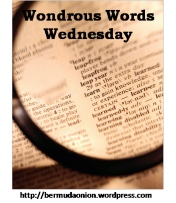 Last week’s post on the origin of “Hat Trick” prompted great discussion on Facebook, as well as the mention of another curious soccer term, the “nutmeg” or “meg” for short. If you think of nutmeg as merely a spice, I’ve got a revelation for you!
Last week’s post on the origin of “Hat Trick” prompted great discussion on Facebook, as well as the mention of another curious soccer term, the “nutmeg” or “meg” for short. If you think of nutmeg as merely a spice, I’ve got a revelation for you!
If you want to learn more about new and unusual words, join the fun with Bermuda Onion’s Wondrous Words Wednesday meme. Visit Bermuda Onion and/or write your own post and link up.
What the Nutmeg looks like in soccer
Sometimes when we’re playing soccer in the back yard, my eldest son sends the ball between my legs as I defend him. He shouts “Nutmeg!”,collects the ball, and shoots on goal. He’s not talking about cooking. The term is used when a player passes the ball between an opponent’s legs and maintains possession.
I hate getting nutmegged! When I defend, I try to keep my legs bent and staggered instead of wide open. But sometimes I forget. And get humiliated.
My dear friend Valerie thought the term might reference a hit to the “no zone” … you know, with the mention of nuts and all.
I’m here to clear up the confusion.
The Meaning of Nutmeg
There are several theories about the origin of the term “nutmeg”. Wikipedia says it comes from “tunnel,” (like a tunnel through the legs) and offers several words used for the trick in foreign languages, including
- “Caño” or “túnel” in Hispanic America
- “Panna” in European, Latin, and African countries (panna is a Surinamese word)
- “Tunnel” or “Beinschuss” (leg shot) in Germany
- “Petit Pont” (little bridge) in French
- “Salad” in Jamaican English

The Guardian has a juicy story, thanks to the book Football Talk – The Language And Folklore Of The World’s Greatest Game by Peter Seddon. Seddon links the term to sneaky practices in the nutmeg trade in the 1870’s. Back then, nutmeg was such a precious commodity that traders would mix wooden replicas into sacks of nutmeg shipped to England. The term “nutmegged” came to mean being deceived and made to look foolish by a clever adversary.
The Guardian also shared some other suggestions, including the fact that “meg” rhymed with cockney slang for leg. Or the notion that “nuts” (another term for nutmeg in Northern England) references the nuts (testicles) of the player tricked by the move. So, Valerie, you might be right!
I like the trading story, myself.
Word Nerd Workout
Can you share another term from sports that has an interesting background?
Thanks for getting nerdy with me.
Julia











